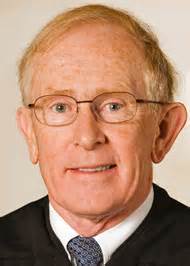Former NYS Supreme Court Justice to Discuss Scholarship Opportunity on Campus
Andrea Currie
News Editor
Students will have the opportunity to receive expert advice next week from Justice Edward O. Spain on winning a $1,500 scholarship. The essay topic for this year’s David A. Garfinkel Essay Scholarship is: “How have the New York Courts addressed equal human rights for the LGBT Community?” The contest is open to all students enrolled in CUNY and SUNY community colleges during fall 2014 or spring 2015.
Spain, a Troy native and former New York State Supreme Court Justice, serves on the Board of Trustees of the Historical Society of the New York Courts, which created the David A. Garfinkel Essay Contest in 2008, in honor of the 50th anniversary of Law Day.
Spain will be in the Marvin Library Multipurpose Room from 2 to 3 p.m. Oct. 27 to answer questions about the award and encourage students to apply.
Valerie Lang Waldin, J.D., M.L.S., faculty librarian and assistant professor, explained that Spain’s visit was important for two reasons. “He’s a great Troy native who’s a very reputable judge, he’s coming to campus, and he wants to come to campus,” she said. “He specifically requested to come to campus.”
“He is very, very well thought of by, I would say, every single person who’s ever had dealings with him,” said Bette Lang, Waldin’s mother. She and her husband, Conrad Lang, a retired court judge, have known Spain for decades.
Students who enter the David A. Garfinkel Essay Contest can choose to address one of four essay questions in the categories of family law, education law, employment law, and criminal law. They should discuss how the New York courts and state legislature have addressed LGBT rights, and they should analyze the impact of these actions.
Despite New York State’s liberal reputation, all significant gains in LGBT rights in the state happened within the last 50 years, and most have happened within the last fifteen years.
Consensual same-sex relations were illegal until 1980, when the New York State Court of Appeals decided People v. Ronald Onofre.
Until the Sexual Orientation Non-Discrimination Act was passed in 2002, it was legal for New York State housing, employment, public accommodation, and educational organizations to discriminate based on real or perceived sexual orientation.
Gay couples could not jointly adopt a child in New York until 2010.
Same-sex couples could not marry in New York until 2011, when the Marriage Equality Act was passed. The act requires that marriages between same-sex and different-sex couples be treated equally in all respects under the law. Legislation was made necessary by the appellate court decision of Hernandez v. Roples in 2006, which ruled that the state constitution does not grant the right for same sex couples to marry.
Until June 2014, transgender people who wished to change the gender on their birth certificate had to provide proof of gender reassignment surgery or hormonal treatment. New York State’s Hate Crimes Act, passed in 2000, does not explicitly forbid gender identity-based hate crimes, though a 2009 federal statute does.
The topic of LGBT rights continues the Garfinkel Scholarship tradition of having students write about complex historical issues.
Previous scholarship essay topics include free speech and responsibilities of the press in the digital age; New York during the Civil War; and the evolution of justice along the Erie Canal.
Essays will be accepted from Dec. 1, 2014, through Apr. 1, 2015. Students who submit their essays by Dec. 12 will be entered in a raffle to win a $25 Starbucks gift card.
For full contest rules and information, visit http://www.nycourts.gov/history/academic-center/garfinkel-essay-scholarship.html

